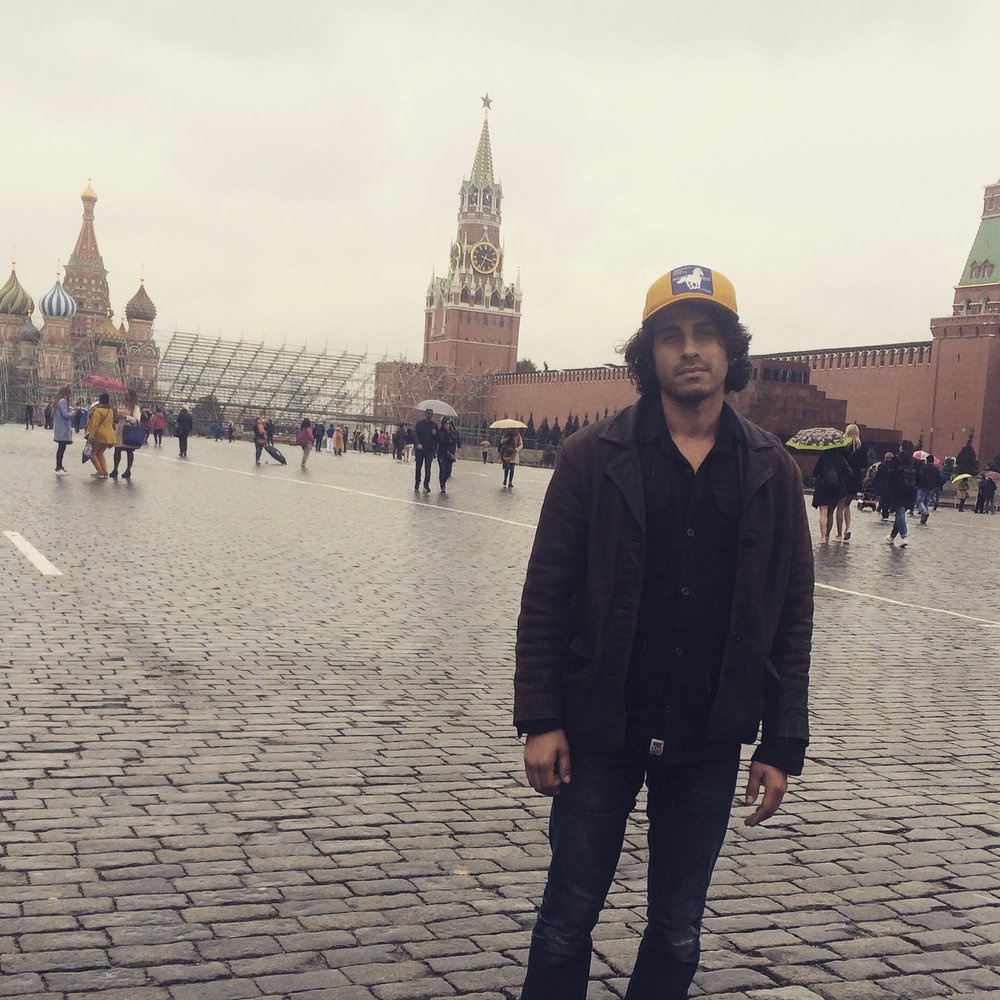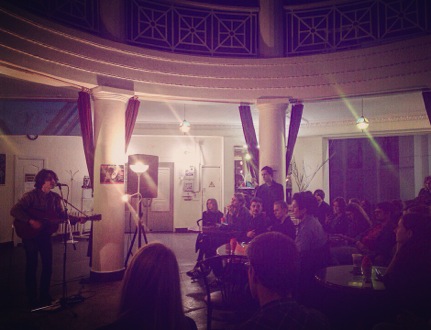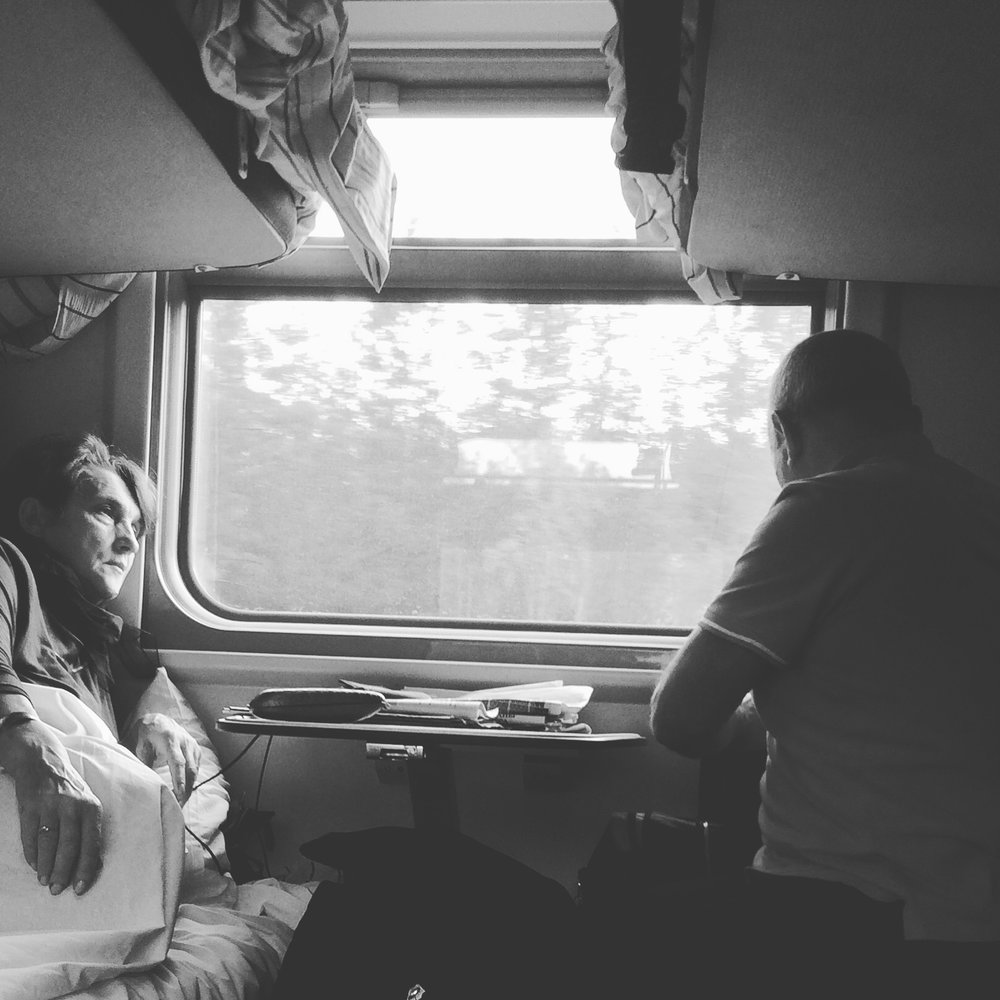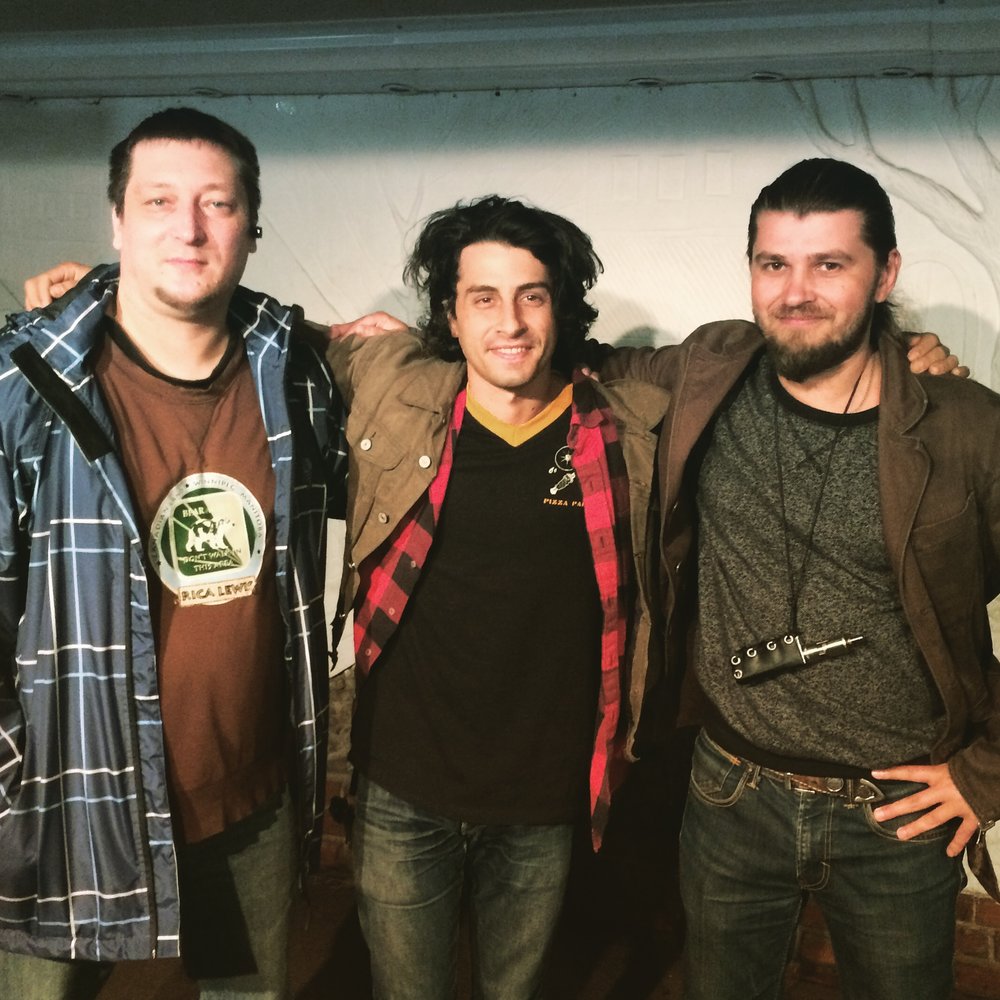
For a musician, touring can be one of the most exciting, exhausting and, well, weird experiences in his or her life. With a community of more than 600 artists, we hear all sorts of stories from touring and are often both shocked and delighted by some of the experiences they share. Recently, we caught up Dan Sheron from Marmoset band, Balto, who shared some snapshots into his bizarrely wonderful solo Russian tour.
This tour was especially near and dear to Sheron, as it was a “homecoming” of sorts. As a fresh-faced, broken-hearted 19 year old, Sheron traveled to Yaroslavl, Russia for an exchange student program. Those formative years in Russia shaped Sheron’s music and personality in ways they never would have had he not been there. Years later, Sheron returned to Russia as a familiar outsider looking back on his former self. In order to process his pilgrimage, Sheron kept a journal — offering insight into his reflective journey and unique creative and personal growth — and was kind enough to share it with us.
Portland, Oregon 10.02.2016 – Notes from Russia’s Rock ’n’ Roll Underground
The dream of touring Russia came to me about eight years ago, as an exchange student in the industrial city of Yaroslavl. It was a turning point in my songwriting – 19 years old, heartbroken, learning to put all those pieces back together into something (hopefully) greater than the sum of its parts. Those songs were profoundly affected by the place — twisted scrap metal siding, dark rain clouds, glum faces, half-finished apartment blocks, mud, tire tracks. All that surface-level brutalism was juxtaposed against profound warmth in the people I met, and I made many friends and met many musicians. In the years that followed, I nurtured the hope that one day I could explore that country through music.
Many false starts later, I found myself in Yoshkar Ola, a day’s train ride east of Moscow, in their approximation of a ‘Rockabilly Bar.” I was exhausted, having slept four hours two days prior and then going straight through the next 40-odd hours on a series of trains, airplanes, long-distance buses and taxis. This night was a busy one — the promoters, Ivan and Misha, had worked hard to get word out in this provincial capital, and the bar was full of a broad range of faces — students, young professionals, middle-aged classic rock fans, the Russian equivalent of rednecks, and some older folks watching curiously from the back.
As with the previous nights, I worked hard in between songs to explain some of the stories that went into them — apparently a novel thing for a songwriter there.
In spite of the fact that the songs are dense and the audience didn’t understand English, the response was very enthusiastic, and it took me several hours of handshaking and drunken conversation before I finally got to bed.
Rybinsk, Russia 09.21.2016
I had intended all along to keep something of a journal while this tour goes on, maybe take some pictures and offer something of a window into what I’m doing here. But once I got started, there was really no stopping, and I haven’t opened my laptop in a week. But my mind has been busy, and I’ll try to explain it.
It goes back to the origins of Balto, a thing I’d tried to move away from as the band grew up and away from its founding myth. Heartbreak, delusional, tragic romanticism and the long road into Siberia had slipped into a vague memory of the person I’d once, perhaps, been — something true, but something I barely even believed anymore.
I didn’t come here looking for the past or to awaken some part of who I once was — I was content letting some things alone. Before I left home, my mind was blissfully blank. But the first morning I woke up in Moscow, my head swimming up out of a jet-lagged, pharmaceutical fog, I found myself hauled backwards. My friends that live here claim that there is an overwhelming melancholy that pervades Moscow, and whatever mania came over me upon arrival only gained momentum as I stalked around the same streets that provided the backdrop for that most miserable and vital period of my life, which culminated in the writing of October’s Road.
Perhaps there truly is something overwhelmingly broken about the energy here, but I’m learning that my mind has triggers in it I didn’t know existed – the smell of metro brakes, the chimes and intercoms on public transportation, the taste of dill on everything. Visions, fantasies, delusions, reminders of what I was and what I could have been; anxieties that can only come from the feeling that I’m somehow living in an alternate universe, where some fundamental and irreversible decision took me to a different end than I should have gone to. And then a seemingly impenetrable wall sprang up in my mind; between the life I’m living in Portland and the one that I thrust myself into — everything so unforgiving and harsh and, for a fleeting moment, thrilling.

Portland Oregon, 10.2.16
Touring in Russia comes with its own set of joys — rapt audiences, legendary hospitality and friendship, vodka chased with smoked fish — and its own set of challenges, ranging from minor nuisances to ordeal-level problems. I made some rookie errors in routing that led to severe sleep deprivation and the inability to commit to any one place for longer than a few hours.
Public transportation networks are dense — you can get nearly anywhere with multiple departures per day. What I hadn’t counted on were the distances. Traveling between major cities in Russia is like shuttling between big urban centers in the western USA – Portland to San Francisco, San Francisco to Salt Lake City, Salt Lake City to Denver. When you combine those distances with the rigid schedules of trains, busses, and the occasional airplane, the result is frantic travel and little rest.
I had forgotten that many of the systems for traveling outside of the tourist centers of Moscow and St. Petersburg are not accommodating for foreigners in the least and antagonistic in the extreme — buying bus tickets, dealing with airport staff, navigating cities, even calling taxis and dealing with neighbors in train cars can be unpleasant and challenging. And I’m fortunate enough to speak fluent Russian. I can’t begin to imagine what it would have been like if that wasn’t the case. With a guitar case, I felt, at times, an unwelcome spectacle.
Nizhny Novgorod, Russia 09.26.2016
10am, Nizhny Novgorod. At the beginning of a seven-hour train ride to Moscow, I was stopped and shaken down by an angry police officer in a newly redesigned black uniform with red trim. He demanded I show my documents, and in finding a bogus excuse (my health insurance card didn’t expressly indicate Russian coverage), he demanded to see all the photos I’d taken on my phone and threatened to pull me off the train for questioning. I paid him about $40 cash and promised that I “did not see him and will not tell anyone about this.”

Portland, Oregon, 10.2.16
All of this said, the shows were fantastic — the kinds of road gigs that we dream of as solo performers and songwriters. Intimate rooms, full of unfamiliar faces, pin-drop silent during the songs, listeners digging into them and asking about particulars after the shows, buying up all the merch I had. I left each town feeling that the sweat it took to get there was well worth it and that I put down roots everywhere I went.
Then there are the scenes themselves — the musicians, the listening “publik” — little corners of the world with vibrant underground music subcultures and talent coming out the ears. Each town I visited had its own community of musicians and fans, from students to middle-aged rockers, and unique spaces for music — coffeehouses on street corners and in shopping malls, formal, well-equipped venues in converted warehouses…even an old Soviet cultural center with a marble rotunda.
Most of the bands and songwriters I shared stages with expressed the necessity of writing in English, as opposed to Russian. Many of the artists that they cite as influences sing in English, and, they say, the language of the song determines the audience — to break into a larger European scene or reach younger, more culturally attuned ears, the songs must be sung in a universal language. With several exceptions, they complain that most Russki-Rock (as it’s called) doesn’t do it for them at an artistic or emotional level. I heard different stylistic threads in the performers I met — from shoegaze and ‘90s indie rock to contemporary indie folk and reggae-infused pop rock to deep house. I had the great fortune to fall in with a scene of electronic musicians and session players in Moscow who showed me a totally different side of Russia’s musical landscape.
Moscow, Russia 09.17.2016
4am. After watching [my friend] Viktor play percussion for a huge outdoor show sponsored by Martini, we moved to a converted arts space called the “Brusov.” It turned out to be a decommissioned riverboat with little cabins converted into studios and shops and a big dance club on the third floor. We listened to my friend Kirill’s newest composition on his rig in an old radio room, while our companions smoked cigarette after cigarette inside. I went home early to get some rest, they stayed out past the dawn.
Portland, Oregon, 10.2.16
I could never imagine writing about this tour without acknowledging and thanking my dear friends and expressing just how much I came to rely on them these last few weeks. They set up and promoted shows, gave me places to sleep, fed me, accompanied me around each town, invited their friends out to the performances and reminded me just how powerful and enduring my friendships are, even after long absence. To my old friends Viktor Glazunov, Andrei and Katya Paporkov, Ilya and Olya Smirnov, Zhenya, Igor, Svetlana, Nana… there are just too many to name. And to new friends – Ivan, Misha, Matvei, Kirill, Anya and so many others who made me feel so warm and welcome. At every turn, I was met with the phrase, “Well, next time, when you come back…” and it won’t be long — I’ve made too many promises.

